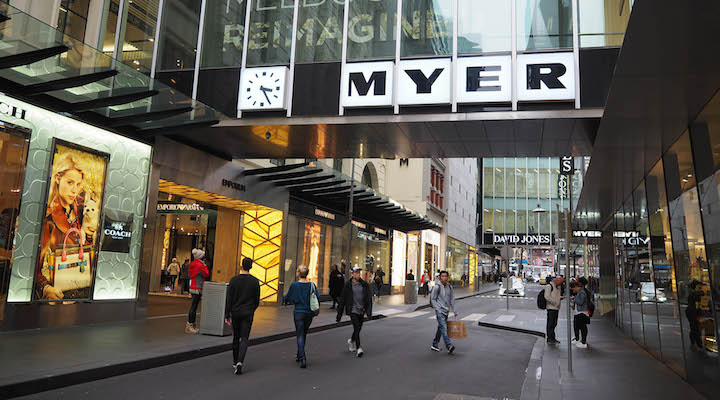Myer reported in its latest trading update that group comparable sales for the first half of FY24 were virtually flat, up by just 0.1 per cent, compared to the first half of the last financial year. The report revealed that online sales were $390.1 million and now account for 21.3 per cent of the retailer’s total sales, up from 20.5 per cent at the end of FY23. Myer currently operates 56 department stores across Australia, as well as its online business and in-house brands including Sass and B
and Bide, Marcs and David Lawrence.
John King, Myer CEO, noted that matching the first half of FY23, which was the retailer’s best first-half sales result on record, was “an encouraging result given the current economic environment”.
It’s no secret that consumer-facing retail has had a tough year trying to stay price-competitive for customers.
“Like many retailers, we have had to contend with inflationary pressures and greater promotional cadence, which has had an impact on profits,” said King.
“Our focus remains on seeking to drive further and sustainable cost efficiencies and inventory management,” he added.
While some industry experts are saying that Myer’s optimistic take on its 0.1 per cent increase is a case of under-promising and over-delivering, the department store CEO is taking the win as a sign of more growth to come.
“We expect the consumer to remain cautious in the second half of FY24 but believe we remain well ]-positioned with the strength of our leading loyalty program, our national distribution centre starting to scale and the continued roll out of successful brand extensions and new additions,” stated King.
Over the last five years as CEO, King has been enacting his ‘customer-first plan’ which has re-established Myer as Australia’s 8th most trusted brand, according to Roy Morgan.
King has been on a 12-month rolling contract with Myer since 2018 and has decided to retire at the end of this financial year to return home to Florida to be with his family.
The trading update also confirmed that Myer’s board has been undertaking a comprehensive search for a new chief executive officer to build on and expand King’s customer-centric initiative.
The customer is always right
After six years executing its ‘customer-first plan’ under King’s leadership, Myer has managed to turn around its reputation with consumers and bolster its bottom line for shareholders – even if only marginally.
The customer-first plan was introduced back in 2019 and remains the centrepiece of the company’s strategy to deliver for all its interested parties.
Myer’s strength is its multi-channel operation including its investment in online, which drove a sales increase of 163 per cent between 2019 and 2023, according to the retailer’s FY23 report.
Its current national distribution centre in Melbourne and upcoming regional distribution centre in Brisbane are key pillars of the plan – designed to stock stores efficiently and speedily fulfil online orders.
Myer doubled down on its customer focus with its loyalty program, Myer One, which was designed to strengthen its relationship with new and existing customers.
Partnering with and leveraging partners including CommBank, Virgin Australia and American Express has helped Myer’s loyalty program generate better engagement and value through improved rewards.
If Myer’s plan to reinvigorate its customer experience covers the substance, then its investment in its store refurbishments covers the style.
Over the last few years, Myer has invested heavily in updating the look of its department stores with renovations of its Bourke Street, Toowoomba, Albury, Chermside, Werribee and Cairns to name only a few.
Myer is proving to be a robust and resilient Australian retailer despite the current economic climate and is focussed on evolving the brand for current and future customers with valuable offerings.
The CEO, executive leadership team and board members remain optimistic that it’s only just starting to see the returns on its customer-first plan and a greater spike in group comparable sales is soon to come – in 2023 the Company distributed $86 million of dividends to shareholders.

